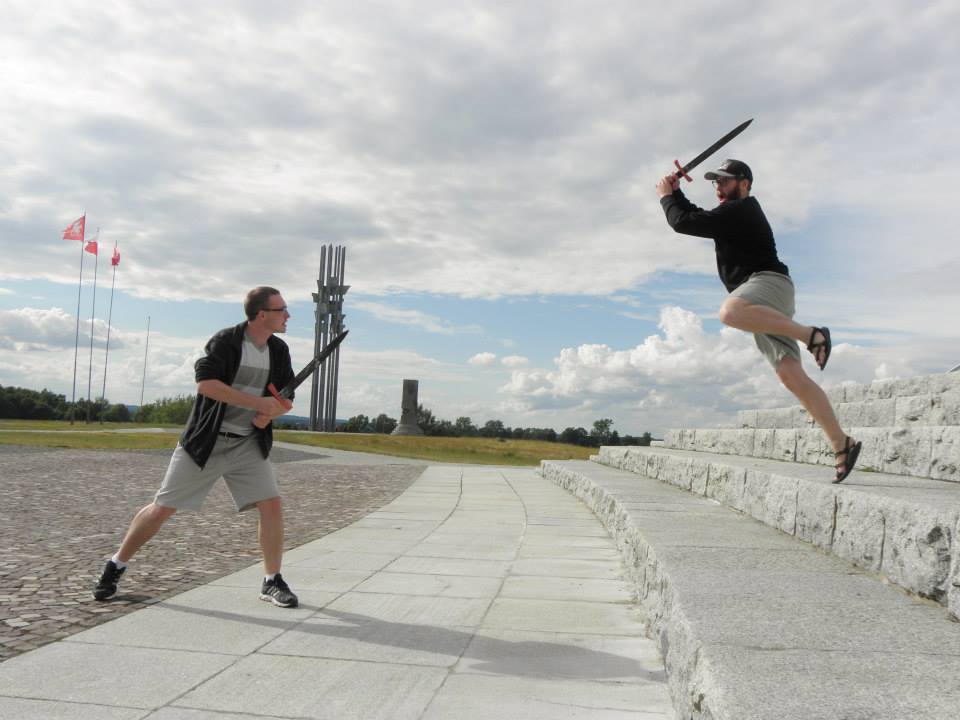Health and Safety Abroad

Study abroad is an exciting and transformative experience, but it is not without risks to your personal health and safety. Taking appropriate precautions before you leave can help mitigate many of these risks. In this section, you will find information about some of the steps to take before you leave that can promote safety abroad.
Research Your Destination
- What are the major health risks in the country(ies) you are traveling to? Visit the Centers for Disease Control and Prevention for more information.
- Determine which vaccines or immunizations you may need in advance. Some may need to be administered several weeks before departure.
- Students can visit their local Health Department, pharmacy or drug store to get immunizations and vaccines.
Prescriptions and Medications
- Bring medications for all existing conditions. Bring enough medication to last the duration of your program.
- Put your medications in your carry on luggage and make sure to keep them in the original prescription bottle. The name on the bottle should match the name in your passport.
- Research whether your medications are legal in the country you are visiting. Here is a useful website with more information: Traveling with Medications
Sexual Health Abroad
There will most likely be differences in the way people relate to one another in your host country. Think about how you will communicate your boundaries. If you feel uncomfortable, don't hesitate to leave the situation.
- There are different cultural perceptions of sex, gender and relationships. Spend some time researching these norms in the country you are traveling to. Prepare for them to be different than life in the U.S.
- Sexual Assault
- Tennessee Tech has resources to support you if you experience a sexual assault. In the case you believe you have experienced sexual misconduct—ranging from sexual assault to intimate partner violence to stalking to sexual harassment—or have questions about whether something you experienced could fall into these categories, consider disclosing what happened to a trusted member of the Tennessee Tech community. We can then assist you with next steps and provide you with resources if you wish to use them.
- The Tennessee Tech Center for Counseling and Mental Health Wellness Staff are available to students studying abroad as well as on campus.
- U.S. Embassies may also have staff on hand to assist in the event of sexual assault.
Alcohol Abroad
- Studies show a new environment affects your tolerance for alcohol - be mindful of this when trying new drinks in new places and in different quantities. Take it easy.
- Many places do not have the same relationship with alcohol as the U.S. It's unlikely that public drunkenness is tolerated by locals.
- Alcohol impairs your judgment and you need to stay on your toes when navigating a new city and a new culture. Alcohol is involved in most of the accidents that occur abroad.
- Keep your eyes on your drinks at all times. Someone may try to put something in your drink to drug you for various reasons. If you need to use the restroom, take your drink with you.
- Some programs may not allow students to drink. This is usually due to cultural norms or safety considerations.
- Intoxication that interferes with program activities or disrupts the local environment is prohibited as outlined in the Student Conduct Policy
- Not all students drink. Maybe that's you. We support that and so should your fellow students.
Drugs Abroad
DON'T DO DRUGS ABROAD!!! Here's why:
- Drug enforcement laws may be much more strict than in the U.S. If you are arrested for drug possession, there's not much any of us can do back here in the U.S. to help you.
- You don't know what substance you are getting, the dosage, or how it may affect you.
- You are going abroad to study, learn, and grow. That's hard to do when you are high.
Regulations of the Host Country
While abroad, you are subject to all rules and regulations of the country. There is a myth that the US government can automatically get you out of jail in a foreign country; they cannot! If you are arrested, someone from the US Consulate/Embassy will contact you and can recommend an attorney. Please note that being a US citizen is not a “get-out-of-jail- free card.”
If you are drunk in public, you might be arrested and put in the “drunk tank” for the night; these are not the kind of memories you want to have about your study abroad experience. Help dispel the stereotype of the American student who only drinks to get drunk. Also, you would become an easier target for thieves. It is important to protect yourself while being respectful of your host country and culture. Tip: Alcohol in other countries may be stronger than alcohol in the US. If you choose to drink, know your limits. Drugs which are illegal in the US are also illegal in most other countries. The punishments for illegal drug use in some countries can be very strict, even life threatening.
Hazards

Traffic
Road accidents are the #1 cause of death and serious injury abroad for young adults.
Remember, people may drive on the other side of the road. Something as simple as crossing
the street may be a challenge. If you aren't sure how to do it, watch the locals.
Crime
Petty theft/pickpocketing is a common occurrence in much of the world. Pay close attention
to your valuables at all times, especially in crowded public areas. Keep bags and
pockets zipped closed and keep your things in front of you. Do not put anything in
your back pockets. Research which areas are not safe to travel at certain times of
the day or alone. Do not give money to beggars. They may alert others to get money
from you and/or not be happy with what you gave them and take all of your money. Take
a friend with you to the ATM when you are getting money out (do not accept help from
strangers at the ATM).
Visibility
Take time to observe your surroundings, ask questions, and engage with your local
partners. Maintain a low profile. Don't go to an ATM and then count your money on
a street corner. Be polite and respectful to your host community. Keep your voice
down!
Protests and Demonstrations
Avoid them! Gatherings that may start peaceful can quickly escalate and turn violent.
It is also illegal in some countries for foreigners to participate in protests.
Fire Safety
You may not spend a lot of time thinking about fire safety, perhaps because the United States has some of the best fire safety laws in the world. This may not be true abroad, so pay attention to your surroundings. Are there smoke alarms? Fire Escapes?
Study Abroad Insurance
Some programs have international health insurance included and some do not. Most of our partner universities require that you purchase insurance separately, and some countries require that you purchase their National Healthcare plan before you can get a visa. Make sure to check thoroughly as to what is included in your program or school fee.
Please see the Study Abroad Website for more information on purchasing Insurance
Most international insurance policies require that you initially pay out of pocket for medical services or medications and they will reimburse you after you submit a claim and the proper documentation.
Information on what to do during an emergency »

